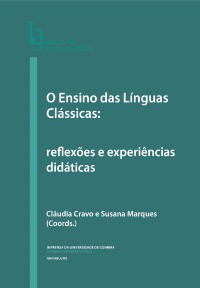Please use this identifier to cite or link to this item:
https://hdl.handle.net/10316.2/90290| DC Field | Value | Language |
|---|---|---|
| dc.contributor.author | Martins, Isaltina | |
| dc.contributor.author | Oliveira, Célia Mafalda | |
| dc.date.accessioned | 2017-10-04T08:57:00Z | |
| dc.date.accessioned | 2020-09-05T23:58:55Z | - |
| dc.date.available | 2017-10-04T08:57:00Z | |
| dc.date.available | 2020-09-05T23:58:55Z | - |
| dc.date.issued | 2017 | - |
| dc.identifier.isbn | 978-989-26-1339-0 | |
| dc.identifier.isbn | 978-989-26-1340-6 (PDF) | |
| dc.identifier.issn | 2182-8814 | |
| dc.identifier.uri | https://hdl.handle.net/10316.2/90290 | - |
| dc.description.abstract | This text begins with some brief reflections on teaching methodologies for classical languages since the 1970s. It explores the idea that culture is inseparable from language and should be appreciated as a whole, as well as the importance of classical languages in the history of the Portuguese language. It emphasises the role that should be adopted by schools for the "Introduction to Classical Languages and Culture" (ICLC) syllabus, as a place for intertextuality and awareness/introduction to the Greek and Roman myths and way of life, based on observation and understanding of the present day. Several topics which can serve as starting points for didactic units are proposed. The second part of the text focuses on a detailed presentation of two didactic proposals that can be explored in ICLC classes. | eng |
| dc.description.abstract | É apresentada, numa primeira parte, uma breve reflexão sobre as metodologias de ensino das línguas clássicas desde os anos 70 do século XX até ao momento. Refere-se a valorização da cultura como um todo indissociável da língua e a importância das línguas clássicas na origem do português. Destaca-se o papel que deve ser assumido pela disciplina de oferta de escola “Introdução à Cultura e Línguas Clássicas” (ICLC) enquanto espaço de intertextualidade e de sensibilização/introdução aos mitos e costumes dos gregos e dos romanos, partindo sempre da observação e compreensão do presente. Apontam-se, de seguida, vários temas que podem ser ponto de partida para unidades didáticas. Numa segunda parte, são apresentadas, de forma detalhada, duas propostas didáticas a explorar em ICLC. | por |
| dc.language.iso | por | - |
| dc.publisher | Imprensa da Universidade de Coimbra | por |
| dc.relation.ispartof | http://hdl.handle.net/10316.2/42965 | por |
| dc.rights | open access | - |
| dc.subject | didactic | eng |
| dc.subject | classical languages | eng |
| dc.subject | didactic proposals | eng |
| dc.subject | didática | por |
| dc.subject | línguas clássicas | por |
| dc.subject | propostas didáticas | por |
| dc.title | “Introdução à Cultura e Línguas Clássicas”: propostas didáticas | por |
| dc.title.alternative | “Introduction to classical languages and culture”: didactic proposals | eng |
| dc.type | bookPart | por |
| uc.publication.firstPage | 129 | - |
| uc.publication.lastPage | 139 | - |
| uc.publication.location | Coimbra | por |
| dc.identifier.doi | 10.14195/978-989-26-1340-6_8 | - |
| uc.publication.digCollection | PB | por |
| uc.publication.orderno | 8 | - |
| uc.publication.area | Artes e Humanidades | por |
| uc.publication.bookTitle | O Ensino das Línguas Clássicas: reflexões e experiências didáticas | - |
| uc.publication.manifest | https://dl.uc.pt/json/iiif/10316.2/90290/202743/manifest?manifest=/json/iiif/10316.2/90290/202743/manifest | - |
| uc.publication.thumbnail | https://dl.uc.pt/retrieve/11044185 | - |
| uc.publication.parentItemId | 56845 | - |
| uc.itemId | 68559 | - |
| item.grantfulltext | open | - |
| item.fulltext | With Fulltext | - |
| Appears in Collections: | O Ensino das Línguas Clássicas: reflexões e experiências didáticas | |
Files in This Item:
| File | Description | Size | Format | |
|---|---|---|---|---|
| _introducao_a_cultura_e_linguas_classicas_.pdf | 562.97 kB | Adobe PDF |  |
Items in DSpace are protected by copyright, with all rights reserved, unless otherwise indicated.
